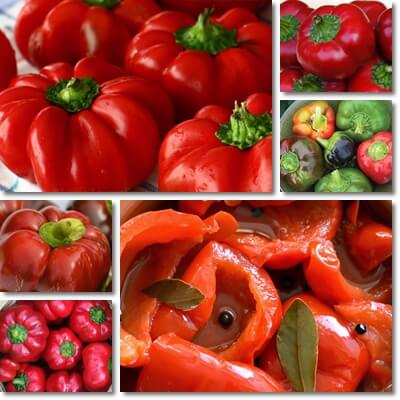The ‘Round of Hungary’ pepper is an heirloom pepper variety, a specialty pepper grown for its meaty, succulent and firm flesh with a bitter-sweet taste.
Also known as the Romanian Gogosar pepper (plural: Gogosari), the Round of Hungary is a fall staple culinary vegetable and the number one pickling pepper in Romanian cuisine, highly appreciated for its lack of pungency and firm flesh.
It’s also commonly used as a winter vegetable in pepper and tomato vegetable spread recipes such as the traditional Romanian ‘zacusca’.
What is the Round of Hungary pepper?
The Round of Hungary pepper is a variety of ribbed, fleshy sweet pepper belonging to the Capsicum annuum species.
Despite commonly being called the Round of Hungary, its origins are unclear which accounts for its many alternative names.
The second most common name for the pepper variety is Gogosar pepper; alternative spelling: Gogoshar pepper (plural: Gogosari, Gogoshari peppers).
The second name is of Romanian origin as the pepper has been extensively cultivated in Romania since the end of World War I.

In the Transylvania region in Romania, the peppers are known as heirloom Transylvanian Gogosari peppers. Other common, but not necessarily accurate names may include: red pimento/pimiento pepper, ruffled pimiento pepper, ribbed sweet pepper, squash pepper, tomato shaped (sweet) pepper, sheepnose pimento/pimiento pepper etc.
What does the Round of Hungary pepper look like?
The Round of Hungary is a round, fleshy pepper with pronounced ribbing and flattened at the base. Fruits are medium-sized to large, with a shiny, smooth peel and extremely meaty.
The peppers are a relatively dark green color when unripe, and turn a deep red to reddish brown when ripe (see pictures below).
The Round of Hungary pepper is classified by most sources as a type of sweet pepper or bell pepper. It does somewhat look like one, except that it’s shorter and wider and is much more ribbed (reminiscent of a beefsteak tomato).
What does the Round of Hungary pepper taste like?
For the most part, Round of Hungary peppers taste mildly bitter when unripe and mildly sweet with rich peppery notes and a faint bitter aftertaste when ripe. The variety is extremely meaty, with a thin peel and a thick, but firm, crisp flesh that oozes pepper-flavored juice.

Uses for Round of Hungary peppers
Round of Hungary peppers are extremely meaty, with a thick flesh that can taste somewhat bitter which is why they are not commonly eaten raw, although you can absolutely eat Round of Hungary peppers raw.
In Eastern and Central European cuisine, the variety is primarily used for pickling, portioned as quarters and marinated in vinegar, water, salt and sugar, sometimes with bay leaves, mustard seeds and black pepper.
Round of Hungary peppers are perfect for salads both raw and pickled, but also make great stuffing peppers (you can stuff them with cheese, mushrooms, other vegetables, rice or meat). You can also make a winter vegetable spread such as the traditional Romanian ‘zacusca’ with tomatoes, grated carrots, onions and even eggplants, and eat it on bread or use it as a pasta sauce.
Nutritional information
Round of Hungary peppers (Gogosari peppers) are low in calories, with under 40 kilocalories/100 g, as well as low-carb, low-sugar, low-fat and low-protein. They are a good source of dietary fiber, vitamins A, B1, B3, B6 and B9, and vitamin K.
Raw round of Hungary peppers are high in vitamin C and pigmented and colorless antioxidants, including chlorophyll in the unripe green peppers and carotenoids in the ripe red peppers. They also contain modest amounts of minerals including iron, magnesium, manganese, phosphorus and potassium, but no sodium.
What are the benefits of Hungary peppers?
Round of Hungary (Gogosari) peppers benefits for health include:
- Good source of dietary fiber with mild laxative properties and benefits for constipation relief.
- Pickled Round of Hungary (Gogosari) peppers are a prebiotic and probiotic food with benefits for digestive health, contributing to good gut bacteria population.
- Benefits for blood coagulation, easy bruising and nosebleeds thanks to a good vitamin K content.
- Immune system boosting properties thanks to a high vitamin C content and manganese.
- Anti-inflammatory benefits from vitamin C and pigmented and colorless antioxidants.
- Benefits for faster wound healing thanks to a high vitamin C content.
- Antiaging benefits thanks to vitamin C which stimulates collagen production in the skin for fewer wrinkles and improved skin elasticity.
- Benefits for high blood pressure: Round of Hungary (Gogosari) peppers are sodium-free and a good source of potassium to help lower blood pressure numbers.
- Other cardiovascular benefits: the high amounts of vitamin C in Round of Hungary (Gogosari) peppers help maintain blood vessel elasticity and clear plaque from blood vessel walls.
- Benefits for anemia thanks to B vitamins and iron which contribute to the production of healthy new red blood cells and improve oxygenation of blood and muscles.
- Good food to eat for tiredness and fatigue thanks to vitamin C which ups iron absorption and B vitamins which boost energy levels.
- Low in calories, carbs, sugar and fat and a good source of essential vitamins and minerals, Round of Hungary (Gogosari) peppers are a good food for healthy weight loss.
- Minor benefits for eyesight from red pigmented carotenoids antioxidants.
- Good food for diabetics: Round of Hungary (Gogosari) peppers are low-carb, l0w-sugar and low-glycemic index and don’t raise blood sugar levels excessively.
What are the side effects of Hungary peppers?
- Allergic reactions. Though uncommon, it is possible to experience an allergic reaction from the peppers, but only if you are allergic to peppers in general.
- Stomach upset. The capsaicin-like components responsible for the pepper taste of Round of Hungary (Gogosari) peppers can trigger mild stomach upset in some people, with side effects such as acid reflux, burping that is acidic, metallic, sour or pepper-flavored, bloating, stomach cramps and loose stools.
- Heartburn. The pickled peppers can cause regurgitation of stomach juices and heartburn.
